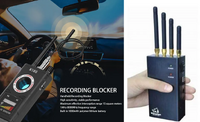2024年01月30日
A guide on obstructing GPS signals
The rise of the Internet of Things has led to an increasing demand for location services. According to certain institutions, it is predicted that 60% of Internet of Things devices will rely on geographical location data. Outdoor positioning, in particular, is expected to be a significant market that should not be overlooked.
The GNSS (Global Navigation Satellite System) is a highly esteemed international club comprising of merely four members, which garners the interest of global leaders and the scrutiny of numerous esteemed scientists and engineers. These four members include the GPS of the United States, GALILEO Galileo of Europe, GLONASS of Russia, and Beidou COMPASS of China.
There are four prominent satellite navigation systems worldwide, including China's Beidou satellite navigation system, the United States Global Positioning System (GPS), the European Union's Galileo satellite system (GALILEO), and Russia's GLONASS satellite system (GLONASS). These four systems are acknowledged as suppliers by the United Nations Satellite Navigation Committee.
China Beidou is a recent addition, yet it stands out as the most dynamic member in terms of development. What exactly is Beidou and how does it influence our daily lives? This intriguing subject has garnered significant attention. Numerous scholarly publications delve into the intricacies of Beidou; however, these professional articles often employ jargon that may deter the interest of the general public.

Small GPS signal blockers great use
The GPS satellite positioning system is the most widely used satellite positioning system globally. It enables vehicle tracking, route navigation, information inquiry, traffic command, emergency assistance, and various other functionalities. While the GPS satellite positioning system has brought immense convenience to our lives, it has also given rise to certain challenges that pose a potential risk to personal safety.
For instance, when dealing with mortgage car companies, the original owner of the car temporarily relinquishes control of the vehicle in exchange for monetary assistance. To prevent any unauthorized retrieval of the car by the original owner, these companies opt to purchase GPS shields. These shields are then installed in the vehicle's parking lot and on the car, making it impossible for the original owner to track the vehicle. This measure effectively safeguards the property's security.
The market for GPS locators is witnessing significant growth, leading to a surge in demand for GPS signal blockers. These blockers are sought after by individuals who desire to evade GPS signal tracking. Nevertheless, it is essential to evaluate the actual effectiveness of GPS signal blockers in shielding signal tracking.
Most GPS locators can be effectively shielded by
gps blocker. The use of blockers disrupts the normal functioning of the GPS locator, preventing complete data transmission to the locator monitoring platform. Similar to mobile phones, GPS locators require the insertion of a mobile phone card or an Internet of Things card to retrieve data. Therefore, as long as the GPS signal blocker can obstruct the signal transmission of the mobile phone card, it can also block the GPS locator.











